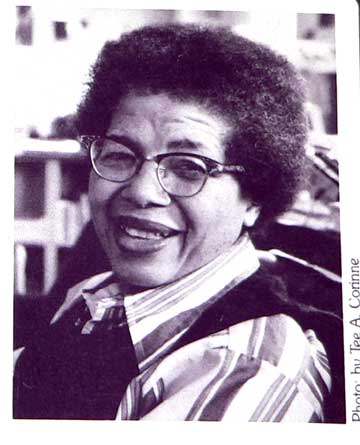 Anita
Cornwell
Anita
Cornwell
was in her forties by the time second wave feminism arrived in the mid-1960s. She soon became one of the few black lesbians in the United States who were living out, speaking out, and writing out. "A Place of Her Own" is excerpted from Anita's pioneering book Black Lesbian in White America published by Naiad Press in 1983.
A Place of Her Own
Perhaps it was mere coincidence, but soon after Anita returned from a brief sojourn in the South--the land of her birth--she decided it was time to leave her Mother's house and establish a home of her own.
At the tail end of August, the moving van arrived, and Anita loaded it down with all of her worldly goods, including her tattered dreams. Mama watched her leave, her mouth clamped tight, her eyes dark with disappointment.
Anita could find no words of comfort for any of them, so she simply said, "Good-bye, Mama."
Her mother nodded, then looked away as Anita turned and ran down the steps, that great, inner necessity urging her ever forward, faster and faster.
Geographically, Anita had only moved to another section of town. Symbolically, she was on another planet. How odd that first night in her new apartment was the first time she had ever been entirely alone the whole night through.
Anita's telephone had not been installed. She knew no one else in the entire fifteen-story building. She felt abandoned. Wounded. Flung against the mocking walls. She was literally stunned by the physcial aspect of her aloneness.
Why did she not realize that there, alone with herself, she would learn to know and live with that alien self that breathed within her body? Yes, there was no getting around it, she knew she had jumped into the raging waters. She would have to survive the best way she could.
And survive she must, because she had yet to write one line that was truly her own.
Soon after breakfast the next day, Anita hurried downstairs to the telphone booth in the lobby and called Mama.
"How is Pennie and how is the new aparment coming along?" her Mother asked in a cheerful tone.
"Oh, I'm fine," Anita replied, relieved that her Mother seemed to be in a much better frame of mind. "I haven't done too much unpacking yet. I was rather exhausted last night once the moving people got through."
"Yes, I know. Moving is a lot of work. But you'll get straightened out eventually," her Mother said in her old, sympathetic way.
After talking with Mama, Anita strolled down to the corner for the Sunday papers, then back to her chaotic apartment, where she made a cup of coffee and settled down amongst the packing cases with the book reviews and the Sunday afternoon symphony.
In a relatively short period of time, Anita had her efficiency in fairly good living order and began having friends in. Friends who had their own ideas about what she should do "to make this into a really groovy pad."
"You ought to get some wall-to-wall drapes," she was told by several of her more affluent pals. "And that bookcase over there separating the dining area from the main living room area should be replaced witha real cool room divider," another pointed out.
Calmly, Anita nodded and smiled at all advice givers. But she was surprised and somewhat distubred. Surely they must have know that she was not the comfy, homemaking body they seemed to assumed she should have been? And what did they expect her to use for money even if she wanted to utilize all their fab ideas?
Actually, Anita was mainly interested in her writing (at its usual stunted stage) and people. Female people, preferably, though technically, she was still in the straight world. Zelmar was far away, and Anita knew no other womin in the Gay life. But at work, she had her eye on Alda James. And sometimes, Anita really believed Alda also had an eye on her.
But it was difficult getting to know Alda, and Anita was still too encased in her iron straight-jacket to branch freely into forbidden territory. So she continued to tread water.
 Alix
Dobkin
Alix
Dobkin
Beginning as a passionate folk singer in the 1960's, Alix grew up in the heart of American folk and ethnic as well as jazz and Broadway musical traditions. In 1970, Alix became a feminist, fell in love with a woman and began to sing and write songs about the forbidden love of women for women. She's still doing it, now as a proud, happy grandma and provisional Steering Committee member of O.L.O.C. (Old Lesbians Organizing for Change). Producer of the groundbreaking 1973 "Lavender Jane Loves Women," Alix has six additional highly praised albums and a songbook.
Besides occasional contributions to "InsideOut"
magazine (Hudson Valley, NY), her "Minstrel Blood" columns infrequently
appear in Chicago's "Windy City
Times," which, when not excerpting her memoirs-in-progress, frequently
inspire the kind of thought-provoking controversy people in the know expect
from Alix.
Appreciating My 'Perculiar' Mother
My Mom could be playful company when we'd sing or converse in rapid-fire exchanges of improvised languages. She delighted in silly humor and puns, the cornier the better and would jokingly refer to the "terlet," or declare an odd thing, "perculiar."
Other times Mom would seem to drown in a silent, brooding ocean of the past that threatened to submerge us all. I rarely saw her cry but frequently saw her close down, condemning both herself and me to the isolation of a childhood as sad as her mother’s bedroom and as dark as the rooms of our Manhattan apartment where the sun never shined. Depressed along with her, abandoned and anxious, fearful of accidentally disappointing or offending her, I also felt responsible for coming to her rescue. Somehow it had become my job, one guaranteed to fail.
"What's wrong, Mom?" my daughter, Adrian, questions, a generation later."Nothing's wrong," I hear myself echo back.
My mother worked long and hard to reduce her suffering before handing it over to me, just as Lotte no doubt sweetened her own bitter legacy from the mean, miserly Julia. Like everyone else in the family, I held my breath through those times when Mom shut us out, trying to take care of her, or keeping out of her way. Neither parent stayed angry for long, but I grew up careful to avoid hurting feelings. In my family this was the supreme offense, unspoken, but carrying the severest emotional penalty.
Pop would sometimes get angry and scowl,
but he wasn't moody and his temperament was steady. He was safer and more
predictable than Mom, whose voice might snap coldly and whose piercing
glance could wither.
Mom loved Horn & Hardart automat but she despised their radio jingle,
calling it “crap.” Commercial exploitation was beneath contempt,
particularly sentimental appeals to "motherhood." She refused
to celebrate "Mother's Day," condemning it as a phony, cynical
holiday whose only purpose was to sell candy and flowers. We never dared
wish her a "happy Mother's Day," let alone give her a card or
present. When Mom was around, rather than risk her icy glare of disapproval,
my friends and I held our tongues during Horn & Hardart radio ads
("Less work for mother ..")
One lunchtime, I was tearing around the landing between the second and
third floors of my building, when a man on his way downstairs asked me
to stop. Very politely he inquired if I was a dancer. "No,"
I said, puzzled and a bit intrigued by the peculiar question. "Are
you sure? You look like a dancer,” he persisted, smiling at me in
a friendly way. I wasn’t afraid, but something about him unsettled
me. "You have the legs of a dancer," he said, reaching out his
hand and squeezing my thigh. Up the stairs I flew to tell Mom about the
encounter. Her eyes flared, then, breathing fire, she was gone, out the
door, looking for the man who, luckily for him, was gone. On her return
I learned that no one has the right to touch me unless I want them to,
and that I should tell her if any man ever tried that again. I still wasn't
sure what it was all about, but I knew Mom would always defend me.
